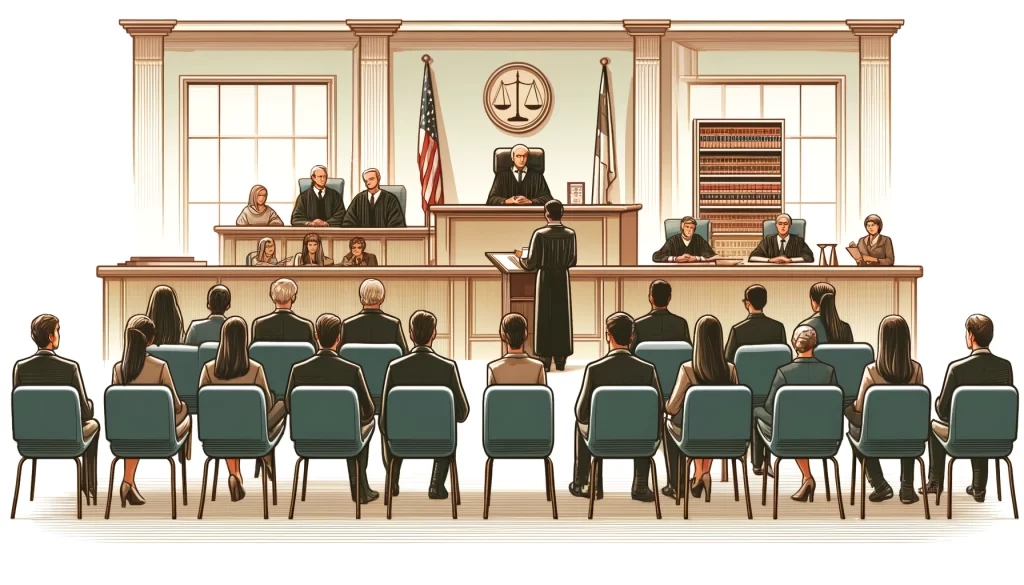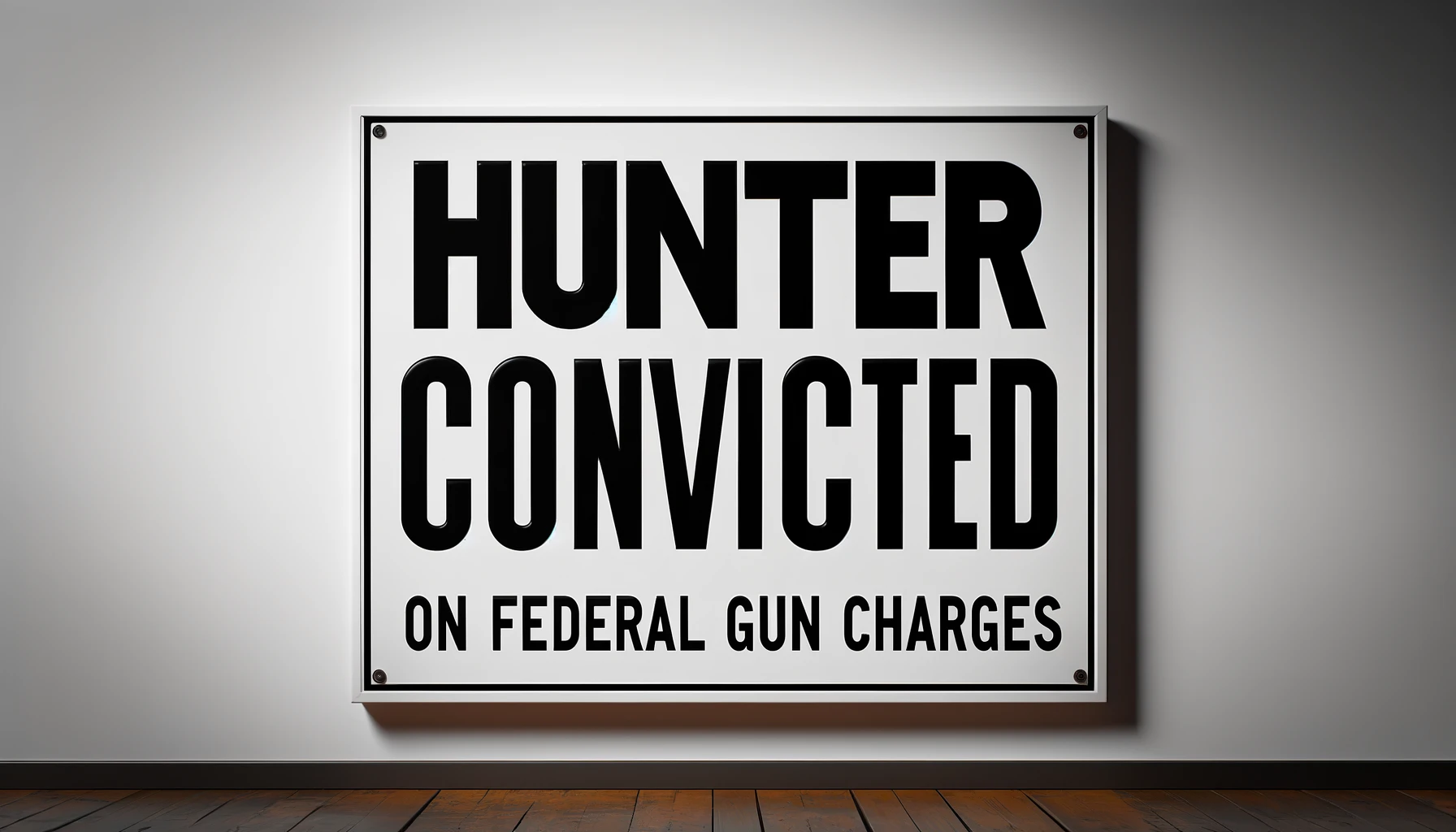Wilmington, Delaware – On June 11, 2024, Hunter Biden, the son of President Joe Biden, was convicted by a jury on three felony charges related to the purchase of a firearm in 2018. The charges stemmed from allegations that Hunter Biden lied about his drug use on a mandatory federal background check form when purchasing a Colt pistol.
Details of the Conviction
Hunter Biden, 54, was found guilty of lying to a federally licensed gun dealer, making a false statement on the federal firearms application by denying his drug use, and illegally possessing a firearm. The trial revealed many details about Hunter Biden’s struggles with drug addiction and personal issues. The prosecution presented numerous text messages and testimony from three of his former romantic partners, including Hallie Biden, the widow of his brother Beau Biden.
Impact on the Biden Family
The conviction is a significant blow to the Biden family, occurring in the midst of a presidential election campaign. Hunter Biden faces up to 25 years in prison, though sentencing guidelines for first-time offenders suggest he may receive a much lighter sentence. President Joe Biden has stated he will not pardon his son and will respect the judicial process. “I am the president, but I am also a dad,” President Biden said in a statement. “I will accept the outcome of this case and will continue to respect the judicial process as Hunter considers an appeal. Jill and I will always be there for Hunter and the rest of our family with our love and support. Nothing will ever change that.”
Trial Proceedings
The seven-day trial made Hunter Biden’s struggles with drug addiction painfully public. The trial included testimonies from three former romantic partners, including Hallie Biden. The prosecution argued that Hunter Biden was using drugs at the time he purchased the gun in October 2018, which he denied on the background check form. The trial also included evidence such as text messages and photos of Hunter Biden with drug paraphernalia or partially clothed.

Prosecutor Leo Wise, in his closing argument, acknowledged the evidence was “ugly” but necessary to prove Hunter Biden was in the throes of addiction when he bought the gun. “This case was about the illegal choices he made while in the throes of addiction,” said David Weiss, the Trump-appointed U.S. attorney in Delaware. Hunter Biden’s defense argued that he did not consider himself an addict at the time of the purchase and was trying to turn his life around, having completed a rehabilitation program in August 2018.
Political Reactions
The conviction has drawn varied reactions from political figures. Former President Donald Trump, who faces his own legal challenges, criticized the trial, calling it a distraction from what he termed the “real crimes of the Biden Crime Family.” Other Republicans expressed skepticism about the significance of the case. Representative Matt Gaetz, a Florida Republican allied with Trump, said on social media that the conviction was “kinda dumb.” President Biden maintained his support for his son, emphasizing the family’s love and support despite the outcome.
Future Implications
Hunter Biden’s legal troubles are not over. He faces another trial in September for failing to pay income taxes during his years of addiction. The Delaware case, brought by special counsel David C. Weiss, is regarded as the least serious of the two federal indictments against Hunter Biden. However, the guilty verdict raises the stakes for any future sentencing if he is convicted in the second trial.
Hunter Biden’s Statement
In a statement following the verdict, Hunter Biden expressed his disappointment but also gratitude for the support he received from his family and friends. He plans to appeal the conviction. “I am more grateful today for the love and support I experienced this last week from Melissa, my family, my friends, and my community than I am disappointed by the outcome,” he said. Hunter Biden’s lawyer, Abbe Lowell, suggested that he might appeal, vowing to “vigorously pursue all the legal challenges available to Hunter.”
This article is based on the following articles:
https://www.reuters.com/legal/hunter-biden-jury-deliberations-resuming-tuesday-2024-06-11

Background Information
Introduction to Federal Firearms Laws and Background Checks
In the United States, federal law requires individuals purchasing firearms from licensed dealers to complete a background check. This check is conducted through the National Instant Criminal Background Check System (NICS) and is intended to prevent firearms from being sold to people who are prohibited from owning them, such as those with certain criminal records or histories of drug abuse.
When purchasing a gun, buyers must fill out ATF Form 4473, which includes questions about the buyer’s criminal history and drug use. Lying on this form is a federal crime and can lead to severe penalties, including imprisonment.
Who is Hunter Biden?
Hunter Biden is the second son of President Joe Biden. He has had a career as a lawyer and investment advisor but has also faced significant personal challenges, including struggles with drug addiction. His personal life has often been in the public eye, partly due to his father’s political career.
Details of the 2018 Gun Purchase
In October 2018, Hunter Biden purchased a Colt pistol from a federally licensed gun dealer. On the background check form, he denied using illegal drugs, despite his ongoing struggles with crack cocaine addiction. This false statement formed the basis of the charges against him.
Understanding Drug Addiction and Its Impact
Drug addiction is a chronic disease characterized by an inability to stop using drugs despite harmful consequences. Addiction can lead to significant personal, legal, and health problems. In Hunter Biden’s case, his addiction led to reckless behavior and legal troubles, as highlighted by his conviction for lying on a gun purchase form.
Legal Proceedings and Sentencing Guidelines
When someone is charged with a federal crime, the case is tried in federal court. If convicted, the sentencing is based on federal guidelines that consider various factors, including the nature of the offense and the defendant’s criminal history. First-time offenders, particularly those who have not committed violent crimes, often receive lighter sentences.
In Hunter Biden’s case, although he faces up to 25 years in prison for the three felony charges, federal sentencing guidelines suggest he is likely to receive a much shorter sentence. First-time offenders who did not use their weapons to commit violent crimes typically receive lighter sentences.
Political Context and Implications
Hunter Biden’s conviction comes at a sensitive time politically, as it occurs during a presidential election campaign. President Joe Biden has maintained that he will not pardon his son and will respect the judicial process. This stance reflects the principle that nobody is above the law, a sentiment echoed by the prosecutors in Hunter Biden’s case.
Former President Donald Trump, who is also facing legal challenges, has used Hunter Biden’s conviction to draw comparisons to his own situation, despite the differences in the nature of their legal issues. This has added to the political tension surrounding the case.
Hunter Biden’s Personal Struggles
Hunter Biden’s struggles with addiction have been well-documented, including in his own memoir. His legal troubles are part of a broader narrative of his efforts to overcome his addiction and rebuild his life. Despite his conviction, Hunter Biden has expressed gratitude for the support he has received from his family and friends and remains committed to his sobriety.
Legal System and Fairness
The U.S. legal system is based on the principle that everyone is entitled to a fair trial and that the law applies equally to all individuals, regardless of their status. Hunter Biden’s conviction serves as a reminder of this principle. His case was prosecuted by David Weiss, a U.S. attorney appointed by former President Trump, who emphasized that the case was about holding Hunter Biden accountable for his actions, not about political motivations.

Debate/Essay Questions
- To what extent should the legal troubles of a politician’s family member impact their political career?
- Do high-profile individuals, such as Hunter Biden, receive different treatment in the legal system compared to ordinary citizens? Support your argument with examples.
- Are the current federal firearms laws and background check requirements sufficient to prevent gun violence, or do they need to be reformed? What changes, if any, would you propose?
- How do Hunter Biden’s legal issues compare to those faced by former President Donald Trump? Should the public and media view these cases through a similar lens, or are they fundamentally different?
Please subscribe to Insight Fortnight, our biweekly newsletter!
